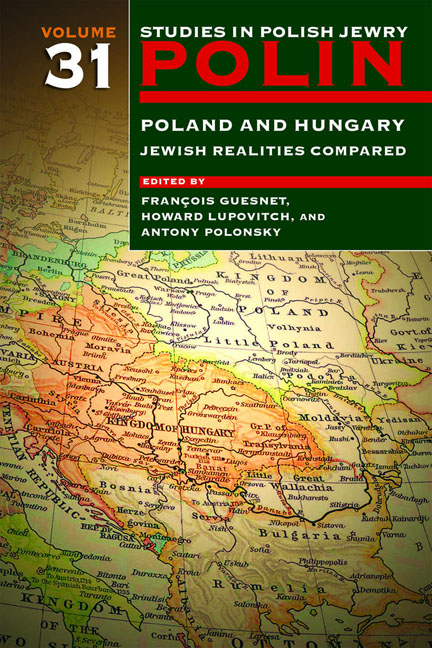Book contents
- Frontmatter
- Dedication
- Editors and Advisers
- Preface
- Polin
- Polin: Studies in Polish Jewry
- Contents
- Note on Place Names
- Note on Transliteration
- Part I POLAND AND HUNGARY: JEWISH REALITIES COMPARED
- JEWISH ACCULTURATION AND INTEGRATION
- JEWISH RELIGIOUS LIFE
- JEWS IN POPULAR CULTURE
- THE INTERWAR YEARS
- THE HOLOCAUST AND ITS AFTERMATH
- PERSONAL REFLECTIONS
- Part II NEW VIEWS
- Part III OBITUARIES
- Notes on the Contributors
- Index
Introduction
- Frontmatter
- Dedication
- Editors and Advisers
- Preface
- Polin
- Polin: Studies in Polish Jewry
- Contents
- Note on Place Names
- Note on Transliteration
- Part I POLAND AND HUNGARY: JEWISH REALITIES COMPARED
- JEWISH ACCULTURATION AND INTEGRATION
- JEWISH RELIGIOUS LIFE
- JEWS IN POPULAR CULTURE
- THE INTERWAR YEARS
- THE HOLOCAUST AND ITS AFTERMATH
- PERSONAL REFLECTIONS
- Part II NEW VIEWS
- Part III OBITUARIES
- Notes on the Contributors
- Index
Summary
What future is in store for my poor child? He was born a Pole; the Russians force him to be a Russian; Jeleński [a Warsaw journalist and antisemite] forbids him to be a Pole. He has no wish to be a German, and he can no longer be a Jew.
ALEKSANDER KRAUSHAR, 1886‘We have forgotten to be ourselves’, said Dr Seltmann. ‘For us, the fact that we are Jews meant only something negative, that we aren't Hungarians like the others. They don't allow us to be that. And from that we didn't go to the very natural conclusion, that we should be positively Jews.’
‘That's not right’, protested Szekeres, practically losing himself in the momentum of the debate. ‘I was and am Hungarian, independently of whether they allow me to be or not.’
IMRE KESZI, 1958THESE TWO QUOTATIONS set out, in summary, the main themes examined in this volume, which is an attempt to investigate the similarities and differences between the Jewish experience in Poland and Hungary in the last two centuries. The first is an extract from a letter from Aleksander Kraushar, one of the leading exponents of Jewish integration in the Kingdom of Poland, to the Polish novelist Józef Ignacy Kraszewski, who had reproached the Jewish supporters of integration for abandoning this commitment in the aftermath of the failed insurrection of 1863. This could hardly be said of Kraushar. During the uprising of 1863, he had co-edited the journals Prawda and Niepodległóść (the semi-official organ of the underground government) in Leipzig and co-ordinated the production of military manuals for publication. When the insurrection failed, he completed his law studies and developed a successful legal practice in Warsaw. He also published articles in the integrationist journals Jutrzenka and Izraelita and in 1865–6 wrote History of the Jews in Poland in two volumes which supported the acculturation of the Jews and their integration into Polish society. In 1871 he married Jadwiga Bersohn, the daughter of art collector and philanthropist Mathias Bersohn, a marriage that strengthened his links with Warsaw's Jewish assimilationist elite.
- Type
- Chapter
- Information
- Polin: Studies in Polish Jewry Volume 31Poland and Hungary: Jewish Realities Compared, pp. 3 - 30Publisher: Liverpool University PressPrint publication year: 2018

